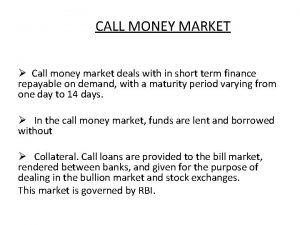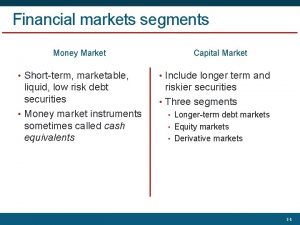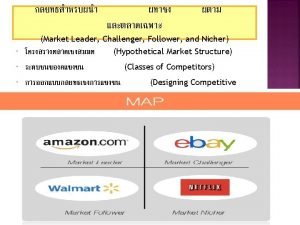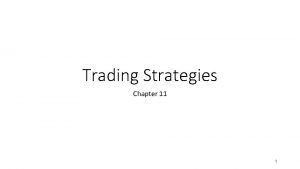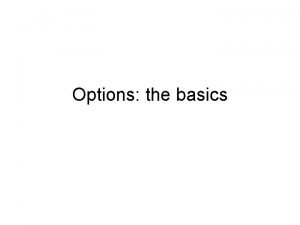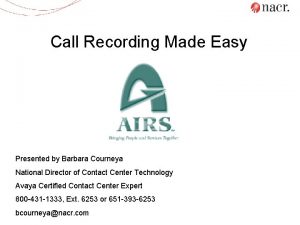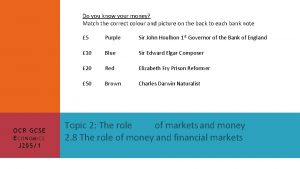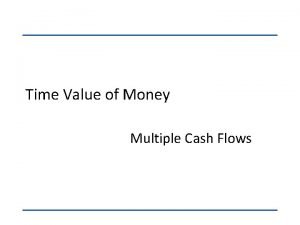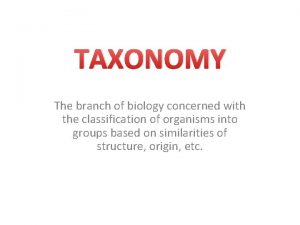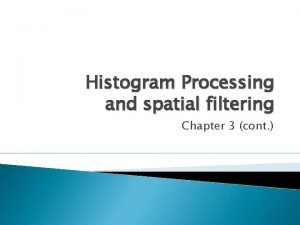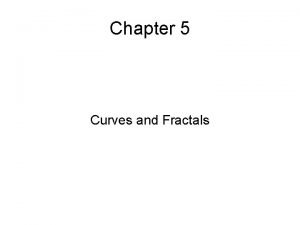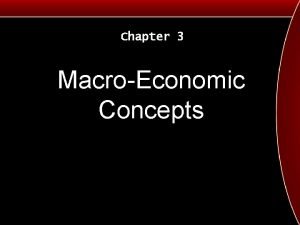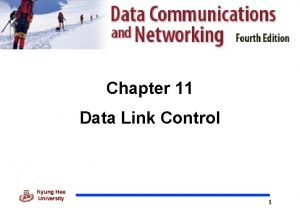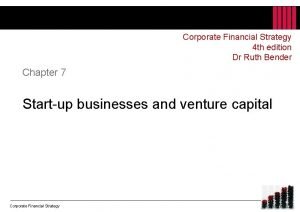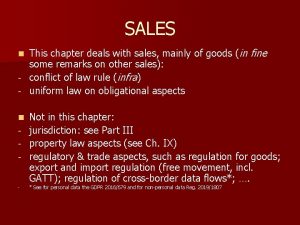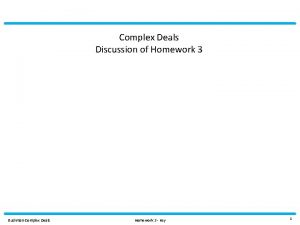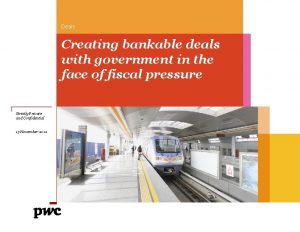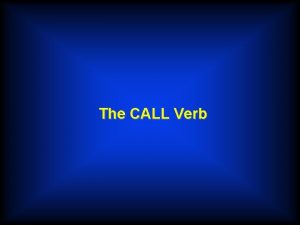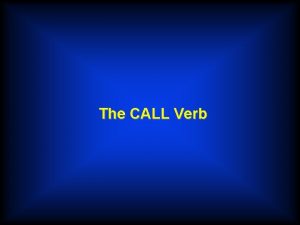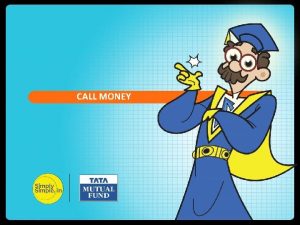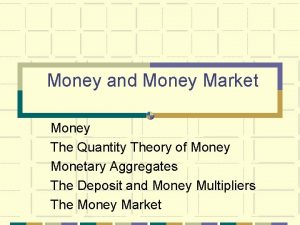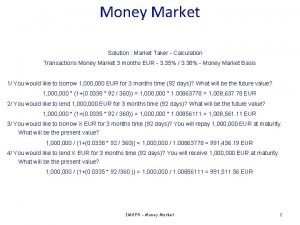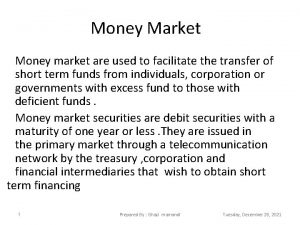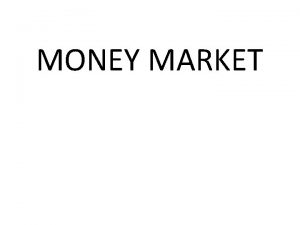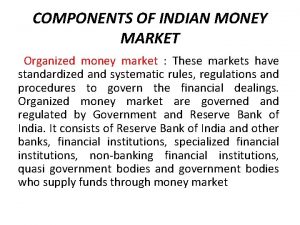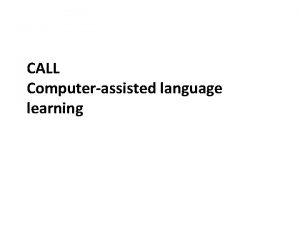CALL MONEY MARKET Call money market deals with
























- Slides: 24

CALL MONEY MARKET Ø Call money market deals with in short term finance repayable on demand, with a maturity period varying from one day to 14 days. Ø In the call money market, funds are lent and borrowed without Ø Collateral. Call loans are provided to the bill market, rendered between banks, and given for the purpose of dealing in the bullion market and stock exchanges. This market is governed by RBI.

Features Of Call Money Market Ø Maturity period of call loans varies between one day to fortnight. Ø It deals in overnight funds. Ø It is a highly liquid asset. Ø Call loans are unsecured. Ø It is affected by seasonal variation. Ø Helps bank to manage short term deficit.

Participants In The Call Money Market Ø All scheduled commercial banks including(SBI). Ø Non scheduled commercial banks. Ø Discount and Finance house of India Ø Securities Trading Corporation of India Ø Co-operatives banks Ø Foreign banks Ø NABARD, LIC, UTI, IDBI

Location Of Call Money Market Call money markets are located in presidency towns mainly MUMBAI, KOLKATA, CHENNAI and DELHI

Why These Cities ? ? ? Ø These are big industrial and commercial centre. Ø Stock exchanges are located in these places. Ø Mumbai enjoys the status of biggest call money market due to head offices of all major banks and it has biggest stock exchange.

Size of call money market The size of call money market is comparatively small due to the following reasons : Ø The volume of call loans upon frequency of trading in bills of exchange or treasury bills. But the bill market in India is not fully developed , so the call loans to the bill market is small. Ø Commercial banks needs to borrow funds from call market are limited because direct discounting facilities are available with RBI.

Ø 3. Moreover , commercial banks in India have large cash reserves ratio, thus their need to borrow funds from the call money market are small. Ø 4. The volume of industrial securities that are traded on stock exchanges is comparatively small, thus less needs to borrow funds by brokers, traders arises. Ø 5. RBI has imposed several restrictions on banks in respect of extending financial support to stock exchanges/advances against shares. Members use their private funds while trading on stock exchanges.

CALL RATE Ø The rate of interest at which funds are borrowed is known as call rate. Ø Calls rate are highly sensitive to the demand supply factors and are variable from day to day , often hour to hour. Ø Within one fortnight , rates are known to have moved from a low of 1 -2 percent to dizzy heights of over 140% per annum.

There are now two call rates in India : Ø The inter bank call rate Ø The lending rate of DFHI. Ø 3. W. e. f. May 1, 1989 , the ceilings on the call rate and inter-bank term money rate were dropped. The Indian call money market has been transformed into a pure inter –bank market during 2006 -2007.

OPERATIONS IN CALL MONEY MARKET

BORROWING OF LOAN Ø The trades are conducted both on telephone as well as on the NDS call system, which is an electronic screen based system set up by the RBI. Ø The settlement of money market deals is by electronic funds transfer on the Real Time Gross Settlement (RTGS) system operated by the RBI. Ø The borrowers and lenders arrive at a deal specifying the amount of the loan and the rate of interest.

REPAYMENT OF LOAN Ø The repayment of the borrowed money also takes place through the RTGS system on the due date of payment. Ø When the loan is repaid with interest, the lender returns the duly discharged receipt.

DEALS THROUGH DFHI Ø The deal can be directly negotiated by routing it through the Discount and Finance House of India (DFHI). Ø The borrower and lender inform the DFHI about their fund requirement and availability at a specified rate of interest. Ø Once the deal is confirmed, the deal settlement advice is exchanged.

The reverse takes place in the case of lending by the DFHI. The duly discharged call deposit receipt is surrendered at the time of settlement. In case the DFHI borrows, it issues a call deposit receipt to the lender and receives RBI cheque for the money borrowed.

RENEWAL OF CALL LOANS Call loans can be renewed upto a maximum period of 14 days only and such renewal are recorded on the back of the deposit receipt by the borrower.

DEALING TIMINGS Deals in the call/notice money market can be done upto 5. 00 pm on weekdays and 2. 30 pm on saturdays or as specified by RBI from time to time.

REPORTING OF DEALINGS Ø All dealings do not require separate reporting. It is mandatory for all Negotiated Dealing System (NDS) members to report their deals on NDS. Ø Deals should be reported within 15 minutes on NDS , irrespective of the size of the deal or whether the counter party is a member of the NDS or not. Ø In case there is repeated non-reporting of deals by an NDS member , it will be considered whether non-reported deals by that member should be treated as invalid.

MONEY MARKET Call Money Notice Money § 1 day only § 1 to 14 days Term. Money Notice § more than 14 days

REPORTS BY VARIOUS COMMITEES 1. Sukhomony Chakravarthy Committee: § Call money market was first recommended by this committee § It also suggested to allow non bank participants

2. The Vaghul Committee Report: It recommended that call market should be restricted to banks 3. The Narashimham Committee Report: It also recommended that the non banking institutions should use other money market instruments

BORROWING NORMS BY RBI § Scheduled Commercial Banks: borrow maximum of 125% of their capital funds on any day, during a fortnight. § Co-operative Banks: Banks should not exceed their borrowings over 2% of their aggregate deposits as at the end march of previous financial year § Primary Dealers: 2 oo% of their Net Owned Funds (NOF) as at the end march of previous financial year in a reporting fortnight

LENDING NORMS BY RBI § Scheduled Commercial Banks: can lend 50% of their capital funds on any day, during a fortnight. § Co-operative Banks: no limits § Primary Dealers: can lend up to 25% of their NOF on average in a reporting fortnight.

ADVANTAGES OF CALL MONEY MARKET 1. Ensures Liquidity 2. High Profitability 3. Safe and cheap loans 4. Assistance to central bank operations

DISADVANTAGES OF CALL MONEY MARKET Ø Limited area of Operation Ø Highly volatile market Ø Lack of integration Ø Unsecured Ø Affected by seasonal variations
 Dana damian
Dana damian Features of money market
Features of money market Capital market
Capital market Unorganised money market
Unorganised money market Market leader market challenger market follower
Market leader market challenger market follower Segmentation targeting and positioning
Segmentation targeting and positioning Protective put diagram
Protective put diagram Stock options terminology
Stock options terminology Qfiniti call recording
Qfiniti call recording Character analysis tom buchanan
Character analysis tom buchanan How is daisy described in the great gatsby
How is daisy described in the great gatsby Money smart money match
Money smart money match Money on money multiple
Money on money multiple Great gatsby meaning
Great gatsby meaning Stoichiometry deals with.
Stoichiometry deals with. Taxonomy is concerned with
Taxonomy is concerned with Histogram processing techniques
Histogram processing techniques Fractals deals with curves that are
Fractals deals with curves that are Macroeconomics deals with:
Macroeconomics deals with: Piggybacking in go-back-n arq
Piggybacking in go-back-n arq Financial strategy example
Financial strategy example Inflectional suffix
Inflectional suffix Crayfish taxonomy
Crayfish taxonomy This chapter deals with
This chapter deals with A 4m-long quarter-circular gate of radius 3 m
A 4m-long quarter-circular gate of radius 3 m

